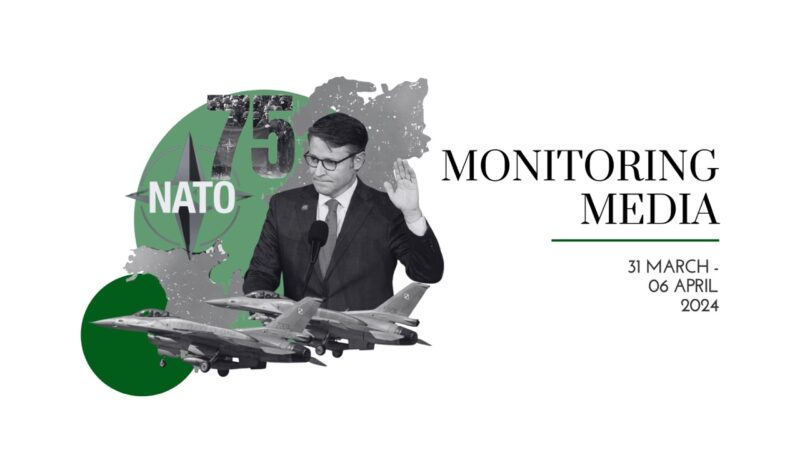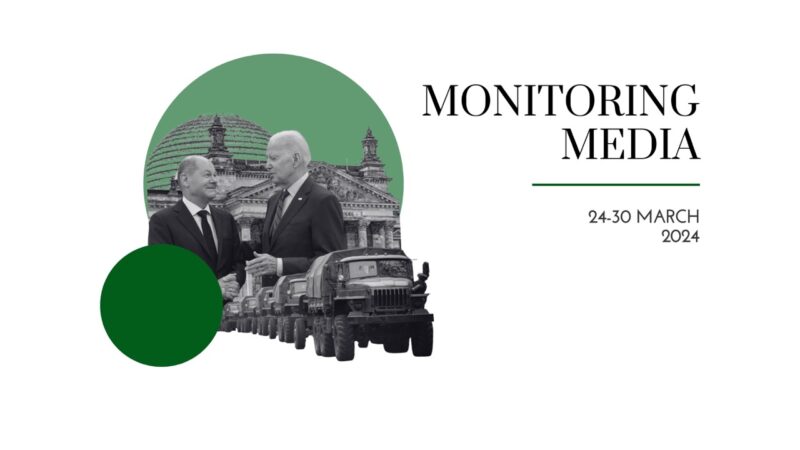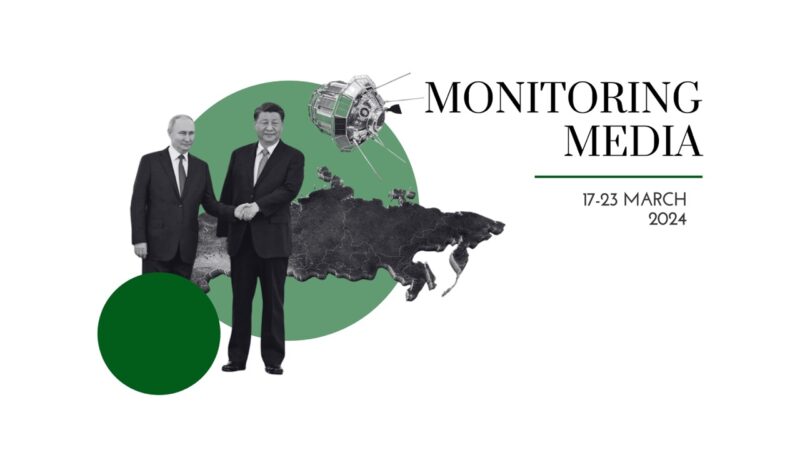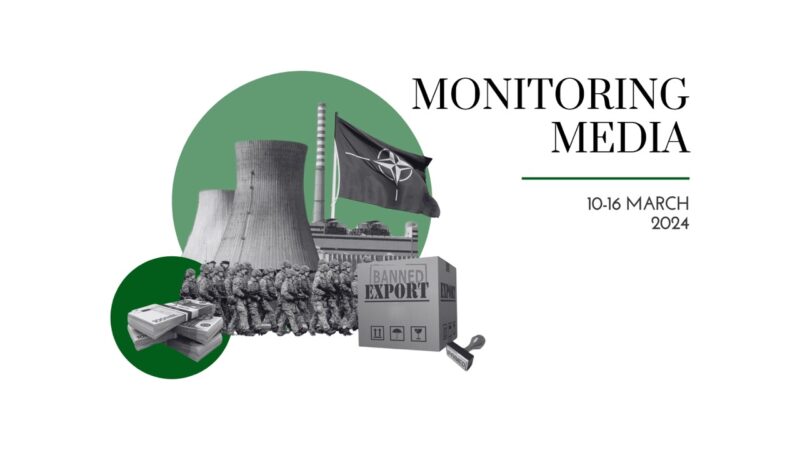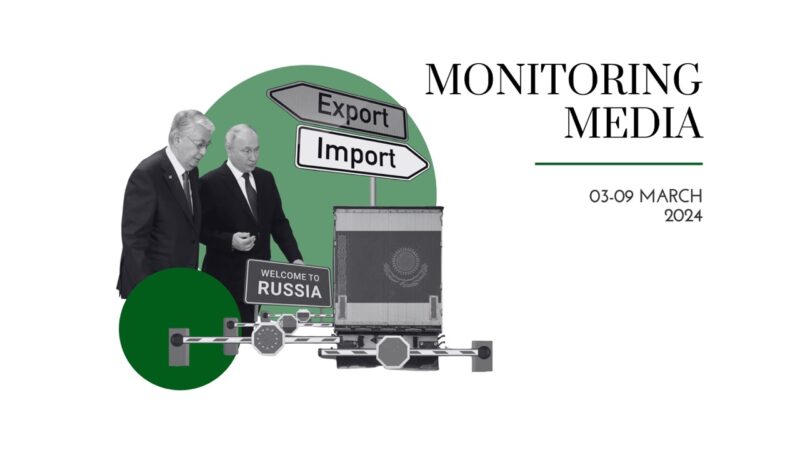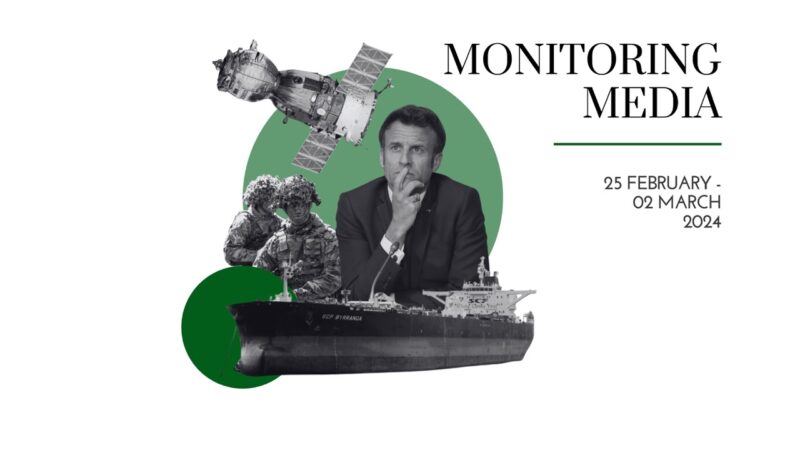Western support to Ukraine has objective limits
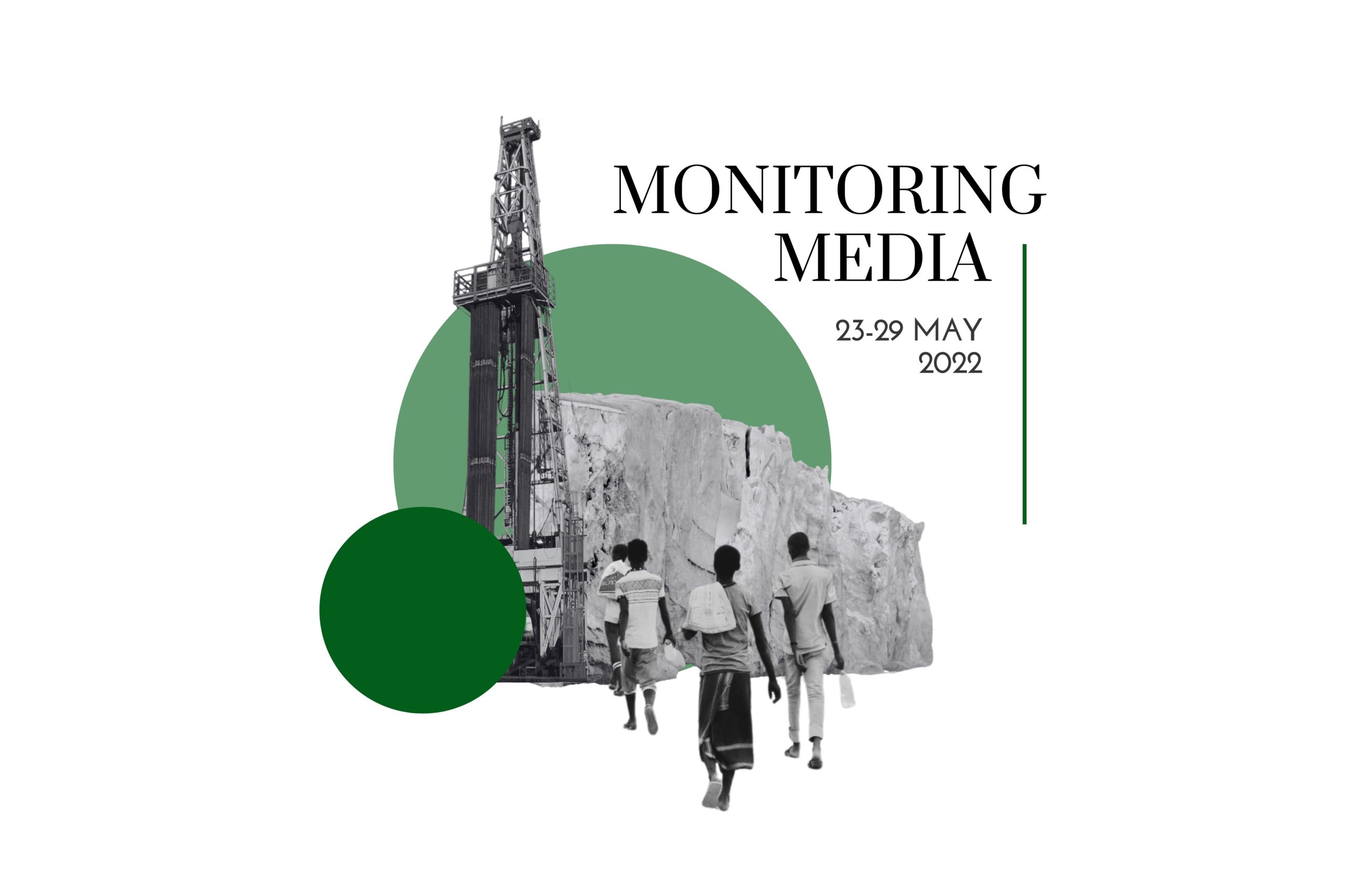
CIUS weekly report on media coverage of Ukrainian affairs, 23–29 May 2022
Three North American magazines (The Conversation, National Review, and Politico) were selected to prepare this report on how the situation in Ukraine has been portrayed in those media outlets during the past week (23–29 May 2022). The sample of magazines was compiled based on their impact on public opinion, as well as their professional reputation, popularity among the readership, and topical relevance. The three magazines in this week’s sample represent the centrist, conservative, and liberal political spectrum.
This report covers only the most-read articles about Ukraine, as ranked by the respective magazines themselves in the past week. It also covers promoted texts on home pages, texts from special sections on Ukraine, texts from paper versions of the magazines, and texts about Ukraine from opinion columns and editorials.
Topics featured in the selected articles:
- Ukraine at war: strengthening of national identity, prosecution of Russia’s war criminals
- The world and Ukraine: US and Canadian support to Ukraine and limitations to this support, China’s growing trade problems, the EU’s incapacity to address war challenges
- Russia at war: the retreat of global companies from Russia’s markets, ideological reasons behind the invasion, Russia’s incentive to stir up a new migrant crisis in Europe, Russia’s war crimes in Ukraine, Russia’s environmental challenges.
The most common arguments:
Ukrainians are standing firm against Russians as their civic national identity is challenged. Lowell Barrington (The Conversation) argues that Russia’s invasion of Ukraine is going so badly because it had been launched based on a misleading “mix of rational calculations and preexisting mindsets.” Putin anticipated that the Russian army would gain an easy victory because he believed that Russians and Ukrainians were the same people. Reality demonstrated, however, that in Ukraine three decades of national identity building encouraged even the most pro-Russian social strata to “look westward to Europe.” Barrington argues that “growing support after 2014 across Ukraine for an overarching, civic national identity—based on Ukrainian citizenship rather than ethnic identity—was the most crucial change.” The ongoing war is further solidifying anti-Russian sentiment and reinforcing national civic identity among Ukraine’s Russian-speaking population.
Ukraine should be careful with prosecuting Russia’s war criminals. Robert Goldman (The Conversation) scrutinizes the case of the 23 May 2022 war crimes trial of a Russian soldier in Ukraine. Goldman concludes that conducting such a trial, even under the due process of national law, “during active hostilities, and by a civilian court, is not normal. Nor may it be wise.” A major concern is that the collection of evidence becomes more complicated during wartime. Furthermore, war crimes in Ukraine should be tried in a specialized military court, not an ordinary civilian one; otherwise, Russia could follow this example and conduct its own war crimes trials with no international body to guarantee the lawfulness of the process.
The US supporting Ukraine is a matter of necessity and opportunity. Jim Talent’s article (National Review) seeks answers to two questions: “Why are we [US] helping the Ukrainians? Why should we care who wins this war?” Talent argues that America’s interest in supporting Ukraine resides in the containment of Russia’s influence in the region and stabilizing the eastern flank of NATO—a matter of necessity—as well as in weakening Russia to the extent that it becomes unable to commit acts of aggression in future—a matter of opportunity. Talent provides an overview of Russia’s recent military endeavours and assesses the US’s responses to them. Today, Washington should demonstrate to the world that it is “at least fitfully capable of acting decisively to impose costs and consequences on those who do us harm.”
US is considering sending advanced rocket launchers to Ukraine. Paul McLeary and Lara Seligman (Politico) highlight that “the Biden administration is leaning toward sending Ukraine advanced, long-range rocket systems that leaders in Kyiv have requested for months.” The final decision on providing Ukraine with such weaponry depends on its defence successes alongside other developments on the battlefield. As of today, the battle for the Donbas has evolved into a long-range artillery duel, where the US-made rocket systems will make a major difference. One of Washington’s concerns, however, is that Ukraine might use the long-range artillery to destroy targets deep in Russia’s mainland.
The US can’t force the world to support its stance on Ukraine. Daniel R. Depetris and Rajan Menon (Politico) highlight that many states, especially developing economies, do not share the Western world’s fervour and are refusing to impose sanctions and/or condemn Russia. This is happening because the mentioned states “tend to regard the war in Ukraine as a regional conflict—not, as the West does, as a grave threat to global stability.” Furthermore, some of the developing economies are putting their national interests above the calls from Washington to isolate Russia. Depetris and Menon conclude that “for many countries outside North America and Europe, picking sides in a confrontation between Russia and the West is a losing strategy whose costs significantly outweigh the benefits.”
US citizens are advised not to join Ukraine’s troops as volunteers. Betsy Woodruff Swan and Christopher Miller (Politico) write that against the background of the Russo-Ukrainian war, Washington is facing new far-right ideology issues in the US. The first is a national security issue: “American white supremacists who fight in Ukraine could return to the US with greater military training.” Therefore, Washington’s position is to discourage but not forbid Americans to travel to Ukraine. The second is the issue of indirect reinforcement of Russia’s propaganda: by discouraging Americans to travel on the premise of obstructing the rise of the far-right at home, Washington adds fuel to the Kremlin’s narrative that Ukraine is a Nazi state. The “Azov” battalion is presented as one of the desirable destination points for American supremacist fighters. This said, Azov officially rejected far-right ideology after it became a part of Ukraine’s Armed Forces. The third is the issue of legal responsibility of US citizens, as joining Ukraine’s army could be interpreted as a breach of “the Neutrality Act [that] bans Americans located in the US from signing up to join foreign armies.” In other words, US citizens fighting for Ukraine might be prosecuted in the future.
Canada has opened its borders and simplified immigration procedures for citizens of Ukraine. Anthony Fong and Zamir Saar (The Conversation) raise the issue of prejudiced treatment of people fleeing from war who arrive in Canada from states other than Ukraine. In particular, Fong and Saar argue that the Canadian government demonstrates “systemic racism” in treating Afghans. The number of approved entrance applications for Ukrainians in two months has been eight times higher than for Afghans in nine months. Also, Afghans undergo much tougher security checks than Ukrainians. This discrepancy may be partially explained by Canadians’ feelings of solidarity following the outbreak of the unexpected war, as well as by pressure from the Ukrainian diaspora. Fong and Saar conclude that “the government should aim to be proactive to refugee crises rather than just reacting to political pressure and the visibility of an issue.”
The EU should regard the Russo-Ukrainian war as an impetus for its own redesign. Florent Parmentier and Florent Marciacq (The Conversation) argue that “Europeans must first and foremost put forward a political initiative to reconnect to their history and geography and thus respond to the challenges of our time both in the East of the Union and in the Western Balkans.” According to Parmentier and Marciacq, a basis for the EU’s redesign may be found in President Emmanuel Macron’s “European political community” approach. The latter anticipates going beyond economic and regulatory integration and converting the EU into a political project—a non-uniform confederation of states. This approach will render all the EU’s enlargement discussions irrelevant and allow Ukraine to integrate to the degree that it alone deems appropriate.
Chinese trade is suffering from Russia’s Black Sea blockade. Sarah Schiffling and Nikolaos Valantasis Kanellos (The Conversation) write that for China’s major seaports, “the war has pushed up prices for goods and services even higher than predicted rises for 2022, as well as adding to logistical difficulties.” The Russian blockade of the Black Sea and its heavy mining created bottlenecks and delays in shipping Ukraine’s grain and oilseeds to developing and developed nations alike. Beyond food, the war has impacted the transportation and consumption of energy resources, which has further exacerbated China’s problems. To address these challenges, Chinese businesses, as well as businesses in other countries, are working on a resilient supply chain system that anticipates keeping “minimal inventories” and using “short-term contracts to be as flexible as possible.”
Major businesses are leaving Russia in the same way as they left South Africa during apartheid. Stephen Bagwell and Meridith LaVelle (The Conversation) state that around 1,000 major businesses decided to leave Russia in the aftermath of its escalated invasion of Ukraine: “Through a combination of withholding funds, selling assets, and refusing to do business with Russian clients and companies, global corporations and investors are making Putin’s Ukraine invasion and domestic repression more costly.” This behaviour resembles the reaction of major businesses and financial actors to the human rights violations during apartheid in South Africa. As of today, the wide-scale corporate exodus from Russia has stirred anti-Putin sentiments among the national business elites. On the social level, as Bagwell and LaVelle believe, the corporate exodus will likely prevent further cases of “the most extreme types of violence” against Ukrainians.
The Kremlin wants to destabilize Europe with a new refugee crisis. Mark A. Grey (The Conversation) argues that an unprecedented exodus of Ukrainian refugees is a part of Putin’s plan to put unnecessary pressure on the EU’s common policies and solidarity: “A mass migration can work as a political tool in two main ways…the sudden arrival of many newcomers can overwhelm housing, health care and other resources and test the patience of receiving populations.” Grey believes that Putin first tested the refugee crisis as a tool of pressure on the EU in 2015/16 when he co-orchestrated the war in Syria. The tool appeared to be successful: it nurtured xenophobia on the continent, propelled nationalist parties to numerous parliaments, and introduced divisions between the EU’s states. As of today, the Ukrainians are perceived positively in the EU; however, local communities are starting to feel the strain.
Russia’s invasion of Ukraine is driven by ideological concerns. Richard Meissner (The Conversation) states that ideologies are sets of principles that help “political actors consider what is right or wrong, how they see themselves, and with whom they associate. This goes along with their interpretation of the world.” Contemporary Russian ideology justifies the invasion of Ukraine as, in its light, Ukrainians and Russians are presented as one people; meanwhile, NATO is a threat that prevents Russia from keeping its neighbours in the “Soviet Union-style sphere of influence.” Ukraine may become an expansion tool in Russia’s energy and food pressure on Europe, and it appears to intend for Ukraine to become a proper case for demonstrating the triumph and validity of Russian values.
Russia’s policies in occupied lands often entails in the brutal destruction of everything Ukrainian. Christopher Miller (Politico) offers an analytic insight into the lives of Daria and Oksana, residents of Mariupol who survived with their families the Russian bombings and filtration camp in February–March 2022. Miller’s insight highlights that Russians are conducting a systematic policy of displacement of Ukraine’s citizens. As of late May 2022, “more than 1,185,000 Ukrainians, including 206,000 children—2,161 of whom are orphans—have been taken from eastern and southern Ukraine to Russia since the start of Putin’s invasion on 24 February, according to Lyudmila Denisova, Ukraine’s human rights ombudsman [since dismissed from this post].” Through interviewing Daria and Oksana, Miller suggests that Russians aim to erase Ukrainian national identity through the forceful separation of well-established communities, confiscation of property of dissenting citizens, as well as strip-searching, prolonged interrogation, and torturing of thousands of detained people.
Russia fabricated language-related justifications to invade Ukraine. Stanley Dubinsky, Anyssa Murphy, Harvey Starr, and Michael Gavin (The Conversation) present the results of their research on the role of shared language in instigating Russian war on Ukraine. They argue that it is “common for people who live near an international border to speak the language of the neighbouring country…however [shared languages have not] devolved into war, at least not in many decades.” The four analysts describe the role of language in the Sri Lankan Civil War, the Serbo-Croatian confrontation, and the Japanese annexation of the Ryūkyū Islands, as well as explain why these cases are different from the Russo-Ukrainian war. The four analysts conclude that “the determination of whether two groups speak different languages or dialects is partly objective and partly determined by politics and power.”
Russian climate science and goals are suffering from the invasion. Katja Doose and Alexander Vorbrugg (The Conversation) argue that the war-related sanctions on Russia will have a major impact on Europe’s energy transition and global decarbonization efforts. Russia’s economy, the world’s eleventh-largest, is heavily reliant on fossil fuels, which makes Russia the fourth-largest emitter of greenhouse gases. With the ongoing war, “many [Russian] businesses…are pressuring the government to roll back environmental regulation in a bid to help them cope with harsher economic circumstances”—which may include withdrawal from the Paris Agreement. At the same time, the sanctions will compromise “climate science in Russia, which matters to those who are implementing practical decarbonization measures in Russia, but also to the global science community.” Such compromising was avoided by the West even during the Cold War.
Russian authorities detained an opposition leader for protesting against the war. Jay Nordlinger (National Review) writes that Vladimir Kara-Murza was detained due to his protests against the war in Ukraine and for comparing the current Russian invasion to the 1968 Soviet invasion of Czechoslovakia. Same as the other 15,000 Russians detained for anti-war protests Kara-Murza faces a 15-year-long imprisonment. Knowing of such a risk in advance, Kara-Murza nevertheless decided to stay in Russia and continue acting against Putin’s regime, which he defined as the “murderous.” Nordlinger defines Kara-Murza as “a brave man in dark times.”
Worth your attention
Ukraine should not be provided with long-range artillery. Paul McLeary and Lara Seligman (Politico) argue that if it acquires long-range artillery, Ukraine might decide to attack targets deep in the Russian rear. If this happens, the invading troops may resort to committing “further atrocities or escalating to chemical or nuclear weapons.” In this light, Washington should apply every effort to avoid provocation.
Ukraine requested long-range artillery from the US on 5 May 2022. President Zelensky made a pledge not to use it against targets on Russia’s mainland.
Long-range artillery would make Ukraine’s counter-offensive more effective and save more lives of Ukrainian soldiers. Long-range artillery would allow destroying the same objects as are being destroyed with available systems today, but farther from the front line: ammunition depots, communication-and-command points, and seaports where military equipment is unloaded.
Long-range artillery will help Ukrainian defenders strike invading forces with greater precision while remaining outside of the zone of the enemy’s fire. Russia’s Grad (hail), Uragan (hurricane), and Tornado systems are not as precise and efficient as their US analogues.
Providing Ukraine with long-range artillery seems to be a proper response to Russia’s unceasing military escalation of the conflict, total destruction of Ukraine’s cities, and indiscriminate killing of civilians. On the other hand, ignoring Ukraine’s requests for effective weaponry may further encourage Kremlin strategists and Russians to commit war crimes and pursue their major war objective, which is the eradication of the Ukrainian nation. Appeasement of the Kremlin by not providing requested weaponry to Ukraine will increase the suffering of the Ukrainian people.
Canada’s warm treatment of Ukrainian refugees signifies systemic racism. Anthony Fong and Zamir Saar (The Conversation) put forward an opinion that “disparate treatment of Ukrainians compared with other refugees reflects unfairness in our immigration process—treatment that others say may result from systemic racism and pressure from diasporas.”
Citizens of Ukraine who apply for Canada-Ukraine Emergency Authorization for Emergency Travel (CUAET) are not treated as refugees by the Federal Government of Canada: “The CUAET is for Ukrainians and their family members who want to come to Canada temporarily due to the crisis resulting from President Putin’s invasion of Ukraine, and then return home when it is safe to do so. It is not a refugee immigration stream.”
Citizens of Ukraine who apply for CUAET arrive in Canada on temporary visas and receive a work permit at the border. They neither obtain refugee status nor may they use the corresponding benefits afforded refugees. Namely, they have no housing provided and no ongoing financial support—which are provided to refugees.
Since they have a work visa, they are provided with basic health care coverage but no support for prescription refills. Starting 2 June 2022, the Government of Canada offers a one-time financial payment to citizens of Ukraine who arrived after the outbreak of the Russian invasion.
The majority of the citizens of Ukraine are coming to Canada to reunite with their own families or temporarily stay with private host families. They are expected to find employment as soon as possible to pay for their accommodation and food. Those Ukrainians who have no families or acquaintances in Canada are expected to find accommodation on their own and cover all their living expenses right away. In sum, there is no denying that citizens of Afghanistan and of Ukraine who have escaped war have different statuses and levels of access to basic necessities in Canada. Their situations are different and should not be compared directly.
